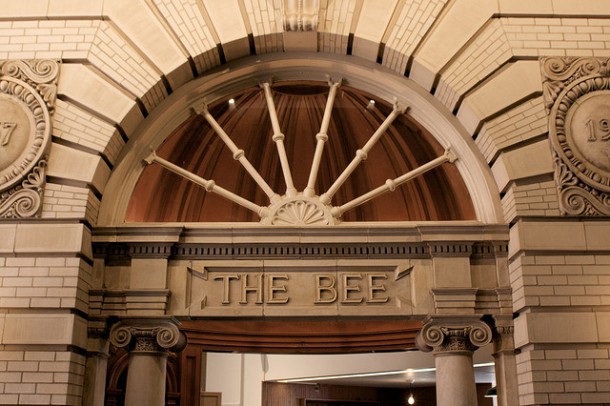
As a child, there were two occasions during the school year that really mattered. The first was the field trip, where if you were lucky enough to have your parent as a chaperone, you were allowed to select who rode in your car. It was a perfectly childish demonstration of power on who would join you for the highly anticipated day.
The second was Take Your Child to Work Day. At the time, I thought this was merely another excuse to escape the classroom and be with my Dad, who was my idol and the king of my heart. But it wasn’t until I spent that whole day with him that I learned a much more important lesson on what being powerful really means.
My father began his career at The Sacramento Bee, the second largest newspaper in Northern California and his sole place of employment for 35 years. Until Take Your Child to Work Day, I had never been to the grand brick building, and was excited to have a peek inside this unknown world that belonged to my father. That morning, I was given a visitor’s badge by the security guard—who appeared frighteningly big, but greeted us with friendly eyes. Despite being excited, I remember clutching my father’s jacket tight and shyly sidestepping behind him as we passed.
My father worked in Desktop Publishing, which was part of the production process of the newspaper. He worked with editors, writers, and columnists in deciding how the paper would appear the next day. He took me down to the production room, and showed me the loud machines, which churned, pressed, and spat out the finished product. It smelled like black ink and that soft, unmistakable papery smell. There was a harsh yellow light that enveloped the room, and it hurt my eyes. Dad spent a majority of his time down there, creating and examining articles, and I wondered if the light ever bothered him.
Occasionally we would cross someone, either the blue-collared maintenance man who would repair the machines, or a suited editor who would poke his head in to ensure that tomorrow’s print was in due order. My dad knew everyone by name and always responded cheerfully. As he worked, he would give me tomorrow’s unreleased sections to read, which I was thrilled to pore over. I’d like to think it was times like this that really influenced my passion for storytelling, reading, and writing.
Later that day, we went upstairs and walked through the marketing department, met the sales team, and greeted the sports writers. Everyone was always happy to see Dad and called him by his nickname, “Mikey.” I remember feeling extra proud when they spun their chairs around from whatever exposé they were typing up and started talking to me. They asked me about school, my little brother, and swimming, which must have meant my father talked about us a lot.
As lunchtime rolled around, we met more people in the cafeteria. This was the 90s and the newspaper business was booming, with people doing any type of job you could imagine. There was the librarian who knew the books I liked, because my dad would borrow them weekly. There was the food critic, who would sometimes bring him along to a new restaurant review. The sports editors were loud, boisterous, and friendly, and even the lunch ladies waved us good-bye at the end of the hour. It was a fantastic day, and at the end of it, I remember feeling grown-up and wishing for another.
Years later, as I began my own career, I often reminisced over this day and my father’s demeanor. He was not the CEO or the president, and his responsibilities involved a partial (albeit crucial) part of the newspaper. His work was behind-the-scenes, not splashed across the front page. However, it was clear to me that everyone respected him. At the same time, he never failed to give people that respect in return, whether it was the CEO or the woman who cleaned the bathrooms. He was personable, approachable, and kind, and he loved doing his job.
That day taught me an invaluable lesson of the kind of person I wanted to be, and more so, the type of leader in the workplace I’d want to become someday. Many people have horror stories of bad bosses and condescending managers, which is a real shame. Regardless of title, I believe the most powerful influence is a positive one, and it begins with fostering a culture of kindness and respect, from the interns up to the boardroom.
And that’s why this day—what started as a day out of the classroom—ended up being one of the most valuable childhood lessons I have ever learned.
